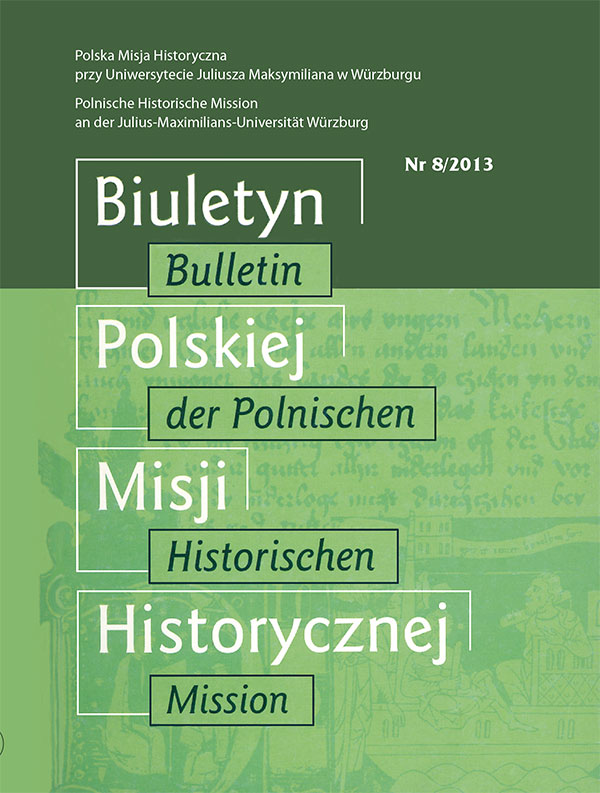Vaterland oder Familie? Das Dilemma des Fürsten Bogusław Radziwiłł (1620–1669)
DOI:
https://doi.org/10.12775/BPMH.2013.003Schlagworte
Bogusław Radziwiłł (1620 – 1669), Henryk Sienkiewicz (1846 – 1916), schwedische Sinfl ut (1655 – 1660), Verträge von Wehlau und Bromberg (1657)Abstract
Thanks to the novel ‘The Deluge’ written by Henryk Sienkiewicz, first published as a book in 1886, the Master of the Horse – Lithuanian Duke Bogusław Radziwiłł was perceived as a traitor during the Swedish invasion of Poland in the years 1655–1660. The writer presented him in a manner which differed significantly from the image of a typical nobleman – szlachcic – of the Polish-Lithuanian Commonwealth. Moreover, according to Sienkiewicz, Bogusław preferred speaking French or German instead of using Polish.
Undoubtedly, the years of the Swedish Deluge constituted a breakthrough in the life of Bogusław Radziwiłł. Events of that time and decisions made by him carved out a place for him in the history of Poland. Bogusław was connected with the Polish royal court. His cousin Janusz Radziwiłł, voivode of Vilnius and Grand Hetman of Lithuania, joined the opposition, and in the spring of 1655 he started negotiations with the King of Sweden Charles X Gustav. Bogusław had to choose and decide whether to support the Polish king or his cousin. He chose to support Janusz and together with him he conducted negotiations with the Swedes.
The aim of the article is to attempt to answer the question what motives
made Bogusław Radziwiłł take the Swedish side during the Swedish invasion of Poland. What was more important to him? His country or the protection of his and his family’s interests? Undoubtedly, his decision was determined by the fact that Bogusław Radziwiłł knew the weaknesses of the Polish-Lithuanian Commonwealth and realized that the country would not be able to help him if necessary. Poland tried to obtain financial and military aid from the Emperor and the Imperial German State. Th at is why the duke probably wanted to safeguard his family and assets. He was not the only one to do so at that time.
Literaturhinweise
Źródła archiwalne / Archivalische Quellen / Archival Sources
Geheimes Staatsarchiv Preusischer Kulturbesitz, Berlin-Dahlem, Etats-Ministerium 111e, Nr. 5 und 6.
Literatura / Literatur / Literature
Augusiewicz A., Z dziejów Królewca – pogrzeb namiestnika Prus Książęcych Bogusława Radziwiłła 6 maja 1670 roku, in: Nad Bałtykiem, Pregołą i Łyną. XVI–XX wiek. Księga pamiątkowa poświęcona jubileuszowi 50-lecia pracy naukowej profesora Janusza Jasińskiego, hg. v. Z. Rondomańska, (2006), S. 192–203.
Borkowska G., Pozytywiści i inni, (1996).
Chachaj M., Zagraniczna edukacja Radziwiłłów od początku XVI do połowy XVII wieku, (1995).
Ciesielski T., Poselstwo Andrzeja Trzebickiego do cesarza i stanów Rzeszy w 1653 r., in: Studia i materiały z dziejów nowożytnych, hg. v. K. Matwijowski, S. Ochmann-Staniszewska, (Prace Historyczne – Instytut Historyczny Uniwersytetu Wrocławskiego 13, 1995), S. 30–51.
Eichhorn K.F., Stosunek xiążęcego domu Radziwiłłów do domów xiążęcych w Niemczech uważany ze stanowiska historycznego i pod względem praw niemieckich politycznych i xiążęcych, (1843).
Jacoby J., Boguslaus Radziwill, der Statthalter des Grossen Kurfürsten in Ostpreussen, (Wissenschaft liche Beiträge zur Geschichte und Landeskunde Ost-Mitteleuropas 40, 1959).
Jarczykowa M., „Czarna legenda” Janusza II Radziwiłła, in: Czasy potopu szwedzkiego w literaturze polskiej, hg. v. R. Ocieczek unter Mitwirkung v. B. Mazurkowa, (Prace Naukowe Uniwersytetu Śląskiego w Katowicach 1903, 2000), S. 21–34.
Kalicki B., Bogusław Radziwiłł, koniuszy litewski. Szkic historyczny, (1878).
Kersten A., Sienkiewicz – „Potop” – historia, (21974).
Kotłubaj E., Życie Janusza Radziwiłła, (1859).
Kubala L., Wojna szwedzka w roku 1655 i 1656, (1913, Reprint 2005).
Mackiewicz S., Dom Radziwiłłów, (1990).
Matwijow M., Poddanie się szlachty województwa krakowskiego Karolowi Gustawowi
w 1656 roku, „Studia Historyczne”, 38, 2 (1955), S. 163 – 182.
Sienkiewicz H., Potop, (2008).
Tazbir J., Nietolerancja wyznaniowa i wygnanie arian, in: Polska w okresie drugiej wojny północnej 1655–1660, hg. v. A. Przyboś, (1957).
Tazbir J., Stando lubentius moria. Biografia Stanisława Lubienieckiego, (2003).
Wasilewski T., Janusz Radziwiłł (1612–1655), in: Polski słownik biograficzny, 30 (1987), S. 212.
Wasilewski T., Radziwiłł Janusz h. Trąby (1579–1620), in: Polski słownik biograficzny, 30 (1987), S. 207.
Wasilewski T., Zarys dziejów Bogusława Radziwiłła, in: B. Radziwiłł, Autobiografia, oprac. T. Wasilewski, (1979).
Wasilewski T., Zdrada Janusza Radziwiłła w 1655 r. i jej wyznaniowe motywy, „Odrodzenie i Reformacja w Polsce”, 18 (1973), S. 125–147.
Wijaczka J., Sukces czy klęska? Traktat welawsko-bydgoski z 1657 roku, „Zapiski historyczne”, 72, 4 (2007), S. 7–21.
Wisner H., Janusz Radziwiłł 1612–1655, wojewoda wileński, hetman wielki koronny, (2000).
Wisner H., Rok 1655 w Litwie. Pertraktacje ze Szwecją i kwestia wyznaniowa, „Odrodzenie i Reformacja w Polsce“, 26 (1981), S. 83–103.
Wojcik Z., Rzeczpospolita na arenie międzynarodowej w XVII w. (Wybrane zagadnienia dyskusyjne), in: Pamiętnik X Powszechnego Zjazdu Historyków Polskich w Lublinie 9–13 września 1969 r., 1 (1971).
Downloads
The publisher's shop:
Veröffentlicht
Zitationsvorschlag
Ausgabe
Rubrik
Lizenz
Die Autoren sind verpflichtet, alle bei der Erstellung des Beitrages beteiligten Autoren zu benennen und (falls zutreffend) die Finanzierungsquellen der Publikation bekanntzugeben, sowie den Beitrag der Forschungsinstitutionen, Verbände und anderen Einrichtungen („financial disclosure“) aufzuführen. Bei Beiträgen, die von zwei oder mehreren Autoren verfasst wurden, sind die Autoren verpflichtet, der Redaktion eine Stellungnahme über den Beitrag einzelner Autoren (einschließlich ihre Zugehörigkeit und Angabe des Autors / Autoren der Konzepte, Annahmen, Methoden etc.) zu übermitteln. Die Hauptverantwortung für den Text trägt der ihn einreichende Autor. Ferner bestätigt der korrespondierende Autor mit der Einreichung, dass alle beteiligten Autoren einer Veröffentlichung zustimmen.
Bitte beachten Sie, dass die Redakteure des Bulletins der Polish Historical Mission das Anti-Plagiat-Programm iThenticate verwenden. Seit 2016 wird jeder Artikel auf Echtheit geprüft. Die Herausgeber erklären, dass aufgedeckte Fälle von wissenschaftlichem Fehlverhalten dokumentiert werden und durch Anzeige bei den entsprechenden Einrichtungen (Arbeitgeber der Autoren, wissenschaftliche Institutionen und Verbände, etc.) der Öffentlichkeit bekanntgegeben werden. Die Erklärung ist ist auch in Form eines Word-Dokuments verfügbar: Eklärung des Autors / der Autoren.
Stats
Number of views and downloads: 917
Number of citations: 0



